Amnesty will promote civil accord, dialogue between society, authorities – Russian rights activists

MOSCOW. Oct 24 (Interfax) – The leaders of Russian human rights organizations believe a broad amnesty timed with the 20th anniversary of the Russian Constitution will help establish effective dialogue between the authorities and civil society.
“Will the authorities find the energy to build relations with civil society again” The best way out of this deadlock would be broad amnesty, which will apply to all people convicted for political cases and everyone who, with a high degree of probability could have fallen victim to punitive justice. These people should, no doubt, include all Yukos case suspects, all Greenpeace activists, and all ‘May 6′ prisoners,” the human rights activists’ statement posted on the website of the Moscow Helsinki group says.
“The number of political prisoners is increasing rapidly. The Pussy Riot case, the Bolotnaya case, the case involving scientists charged with espionage, the Krasnodar environmentalists’ case, and the Arctic Sunrise case show the authorities’ readiness to openly ignore elementary norms of law. Aggression is increasing in society, and the recent ethnic violence are just its first symptoms,” the activists said.
“This broad amnesty is the last opportunity to promote civil accord and real dialogue with the authorities in Russia,” the document, which was signed by Lyudmila Alekseyeva, Lev Ponomaryov, Sergei Kovalyov, Valery Borshchev, Svetlana Gannushkina, Alexander Cherkasov, and other activists, says.
Last week, the human rights council sent proposals to the Russian president on the draft amnesty, which may be announced to mark the 20th anniversary of the Russian Constitution (December 12).
Vladimir Putin earlier ordered the human rights council to prepare appropriate proposals.
The human rights council said this amnesty may apply to the Bolotnaya case suspects, the Yukos case suspects, and many people convicted for non-violent crimes that did no lead to grave consequences.
Andrei Babushkin, a member of the human rights council, said the amnesty may apply to 200,000 people.
